July 28, 2014
|
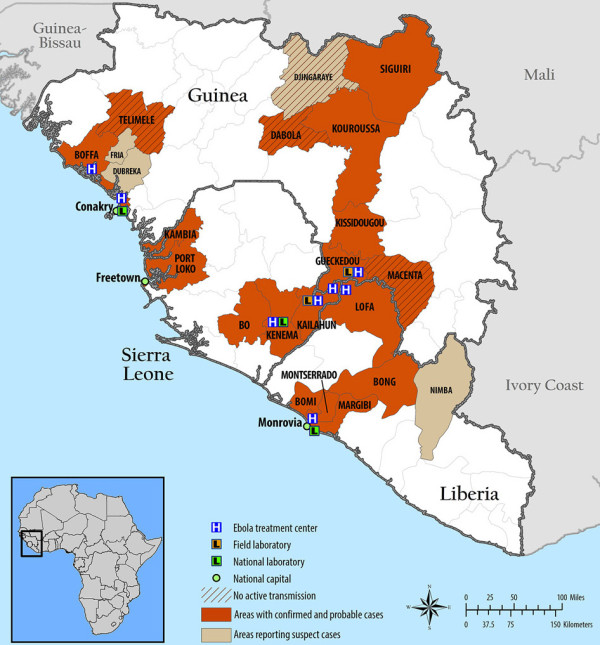
Steve Dennie, Communications Director
It’s the worst Ebola outbreak in history, and Sierra Leone is right in the middle of it. This is the first outbreak in West Africa, and the first outbreak to cross national borders. It started in Guinea in February, and spread to neighboring Liberia and Sierra Leone.
Sierra Leone, which is ill-equipped to deal with the disease, now has the most confirmed cases–454 as of July 25. Of those, 224 have died. Among the deaths was a United Brethren woman from our church in Kenema, the country’s third-largest city. In addition, three workers at our Mattru Hospital have been diagnosed with Ebola.
Doctors Without Borders, which has a team of 300 working in the three countries, says the disease is out of control. There have been over 1100 confirmed cases, of whom nearly 700 have died. The death toll as of July 25:
- Guinea: 319.
- Sierra Leone: 224.
- Liberia: 129.
Ebola victims have been identified in over 60 locations across those three countries. Persons boarding international flights from the three capitals–Freetown, Monrovia, and Conakry–are now being checked for signs of fever. In addition, Nigeria, the largest country in Africa, experienced its first Ebola death on July 22, when an American flew into the country after having been exposed to Ebola while in Liberia.
The virus commonly infects healthcare workers. Dr. Sheik Umar Khan, the main doctor leading the nation’s fight against Ebola, and who treated over 100 patients, contracted Ebola and died on July 29. Three nurses who worked with Dr. Khan had previously died.
In neighboring Liberia, two American missionaries have contracted Ebola. Both have worked at the same hospital on the outskirts of Monrovia since the fall of 2013. Both are in critical condition. Dr. Kent Brantly, 33, from Texas, was medical director for the Samaritan’s Purse Ebola care center. Nancy Writebol, from North Carolina, with SIM (Serving in Mission), worked as a hygienist who decontaminated persons entering or leaving the center. Both are married with children. On July 25, Samaritan’s Purse in Liberia saw 12 new cases, of whom eight were medical personnel.
Cases have been reported in the capital cities of all three countries. Crowded, urban centers can easily spread Ebola. In Sierra Leone, nearly all cases have occurred in the parts of the country where United Brethren churches exist. The Kailahun and Kenema regions, in the east, have been designed as “high risk” areas. Schools in the Kenema area are closed and travel restricted.
The government hospital in Kenema is one of the best-equipped hospitals in the country. However, there is just one nurse for every 550 patients.
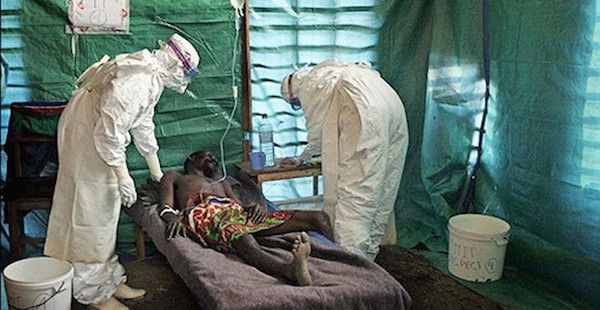
What is Ebola?
Ebola typically kills 90% of the people infected, and there is no vaccination. However, early detection and treatment have reduced the death rate to 60%.
Ebola is is named after a river in the Democratic Republic of Congo (formerly Zaire), where one of the first outbreaks occurred in 1976. In that outbreak, 280 of 318 infected people died.
Ebola takes 2-21 days to incubate. Once symptoms appear, many people die within 10 days. Ebola isn’t contagious until symptoms appear–fever, headache, fatigue, sore throat, muscle pain. Since those symptoms are common with various ordinary ailments, including malaria, Ebola is often not recognized right away. Symptoms progress to vomiting, diarrhea, kidney and liver problems, and ultimately, massive internal hemorrhaging and bleeding from the eyes, ears, and other orifices.
Ebola is highly contagious. It can spread through contact with blood, saliva, sweat, urine, as well as through contact with objects (like needles) which have come in contact with infected bodily fluids. It lingers in infected corpses and can infect people who handle corpses.
An International Scare
Patrick Sawyer, a Liberian who lives in Minnesota with his American wife and children, boarded a plane in Liberia, stopped in Ghana, changed planes in Togo, and arrived in Lagos, Nigeria, on July 22. He died five days later. He probably contracted Ebola from his sister in Liberia, who had recently died of Ebola.
Sawyer collapsed after leaving the plane and was immediately isolated. All other passengers on that last flight are being monitored, and efforts are being made to locate others he came in contact with during his journey.
Think of how many people he probably came in contact with. Think of sitting shoulder to shoulder with him in a cramped airplane seat, knowing that Ebola can be passed via sweat through clothing. In August, Sawyer was due to return to his family in Minnesota.
The Nigerian government shut down the private hospital in which Sawyer died and began a decontamination process, which was expected to take a week. Hospital staff, along with 59 of Sawyer’s fellow plane passengers, are being monitored closely. Nigeria’s largest airline has suspended flights to Liberia and Sierra Leone.
Ebola Awareness and Prevention Project
Global Ministries is sponsoring a project which would enable Mattru Hospital to focus resources on the Ebola epidemic.
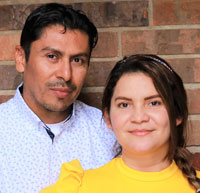 Since United Brethren ministry to Spanish-speakers began in 1951, Honduras National Conference has grown to include over 115 churches, an international school, a retreat center, and a theological institute. However, an unfulfilled ambition has been to send missionaries overseas.
Since United Brethren ministry to Spanish-speakers began in 1951, Honduras National Conference has grown to include over 115 churches, an international school, a retreat center, and a theological institute. However, an unfulfilled ambition has been to send missionaries overseas.
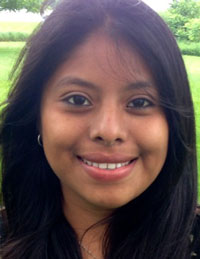 Maria Pavon would tell you God called her to be a missionary from a young age. Growing up in Nicaragua, the daughter of pastor and superintendent Rev. Juan Pavon, she had plenty of opportunities to be involved in ministry, but missions seemed a distant dream.
Maria Pavon would tell you God called her to be a missionary from a young age. Growing up in Nicaragua, the daughter of pastor and superintendent Rev. Juan Pavon, she had plenty of opportunities to be involved in ministry, but missions seemed a distant dream.

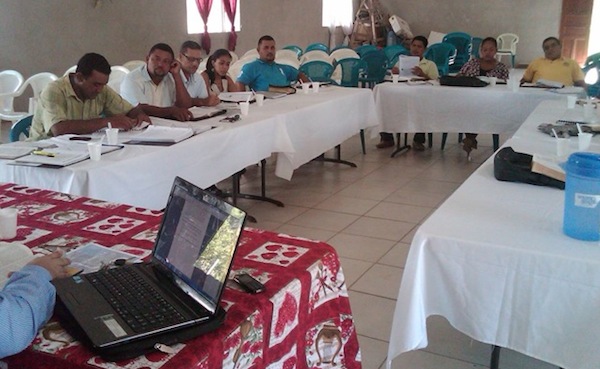
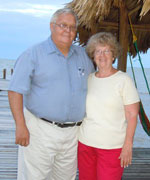 Darlene Eberly, the wife of Robert Eberly, passed away at 7:45 Tuesday morning, July 8. In March, she began radiation treatments for aggressive melanoma cancer.
Darlene Eberly, the wife of Robert Eberly, passed away at 7:45 Tuesday morning, July 8. In March, she began radiation treatments for aggressive melanoma cancer.